Traditional medicine is a valid healthcare alternative in African communities if regulated
The use of traditional medicine and its perceived negative impact has raised several concerns, and given rise to a dilemma. On the one hand is the notion that traditional medicine is not clinically tested in the way that modern medicine is, and on the other, many people overlook the fact that most traditional herbs, or their extracts, are used extensively in modern pharmaceutics. This debate is often uninformed in that the dominant issue is the governance of traditional healing systems rather than the merits of the respective practices per se. All medical practices are susceptible to malpractice. The difference, arguably, is that there are standard governance processes overseeing the practice of modern medicine, to root out charlatans.
In the absence of easy access to the prevailing healthcare system in South Africa, traditional medicine has, in some rural areas, become a basic and primary alternative. Due to COVID-19, people are often afraid to travel as they have to take crowded public transport, which increases the risk of infection and amplifies COVID-19 spread. Evidence suggests that some rural communities have embraced the use of traditional medicines and herbs as their preferred healthcare system, which is perceived as the most reliable, accessible and affordable healthcare option.
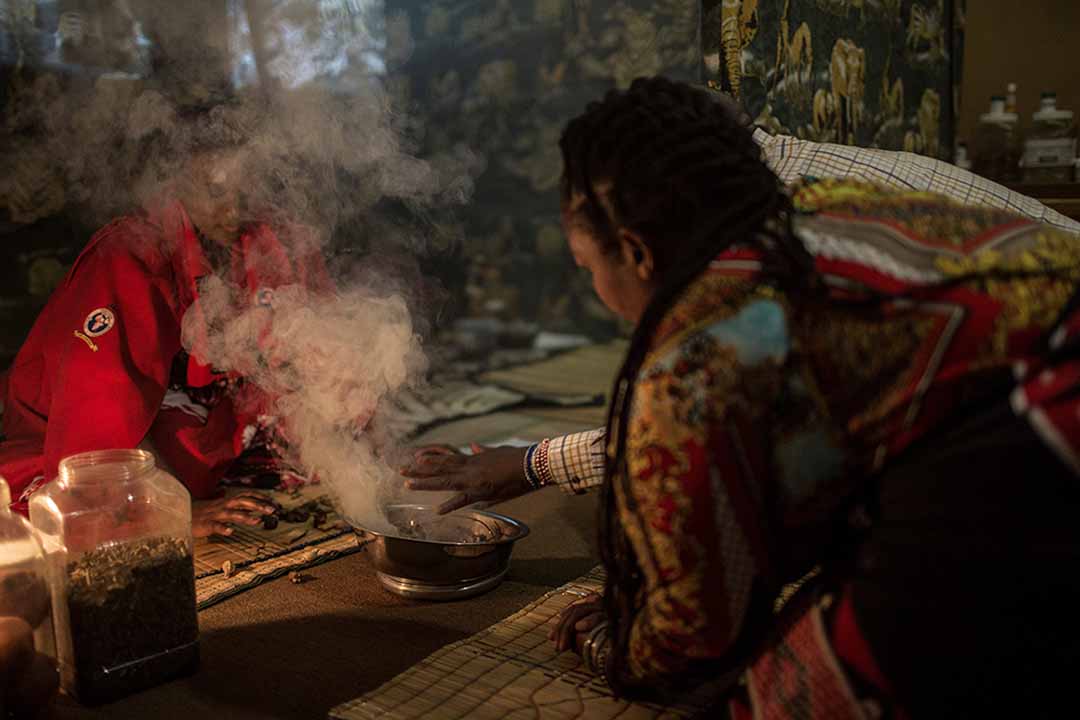
Gogo Phephisile Maseko, 44, traditional healer and national coordinator of the Traditional Healers Organisation (THO) of South Africa attends to patients on October 1, 2018 using a blend of cannabis and other herbs in a consultation room at their offices in Johannesburg. – South Africa’s top court decriminalised in September 2018 the private and personal use of cannabis in a landmark case that pitted law enforcement agencies against cannabis advocates. (Photo by GULSHAN KHAN / AFP)
Since COVID-19 has hit the more vulnerable rural areas in South Africa, the most popular ancient traditional medicines, “UMhlonyane and UMjuluka” (African wormwood and a succulent called aptenia, respectively), have re-emerged. These products are typically used for the treatment of flu-like symptoms in African rural areas. UMhlonyane (see video below) is mostly used for alleviating coughing and releasing occluded sinuses and a tight chest. It is also used to reduce fevers and colds while combatting muscular pain, in addition to treating other conditions such as liver infections, swelling, blood afflictions, mouth sores and gum swelling. UMjuluka is said to fight diseases that cause sweating, pain and cold shivers. In most cases these plants are found growing naturally in the fields and on mountains in rural areas, and the harvesting is generally conducted in a sustainable manner that mitigates extinction risk. Beneficiaries of these plants believe they must be fully grown for the treatment to be effective, so harvesting is done in a way that allows the plant to multiply organically.
In the absence of regulation, people need to seek the right information from the right sources (registered traditional healers and credible books on medicinal plants). Also, there appears to be a pervasive lack of understanding regarding exactly what constitutes traditional medicine or traditional herbs. Some people incorrectly perceive traditional medicine/herbs – also known as “umuthi” – as the practice of witchcraft. The word “umuthi” means African medicine which mostly comprises plant roots, leaves and bark from trees (which sometimes need to be dried out so it can be converted to a powder form for consumption).
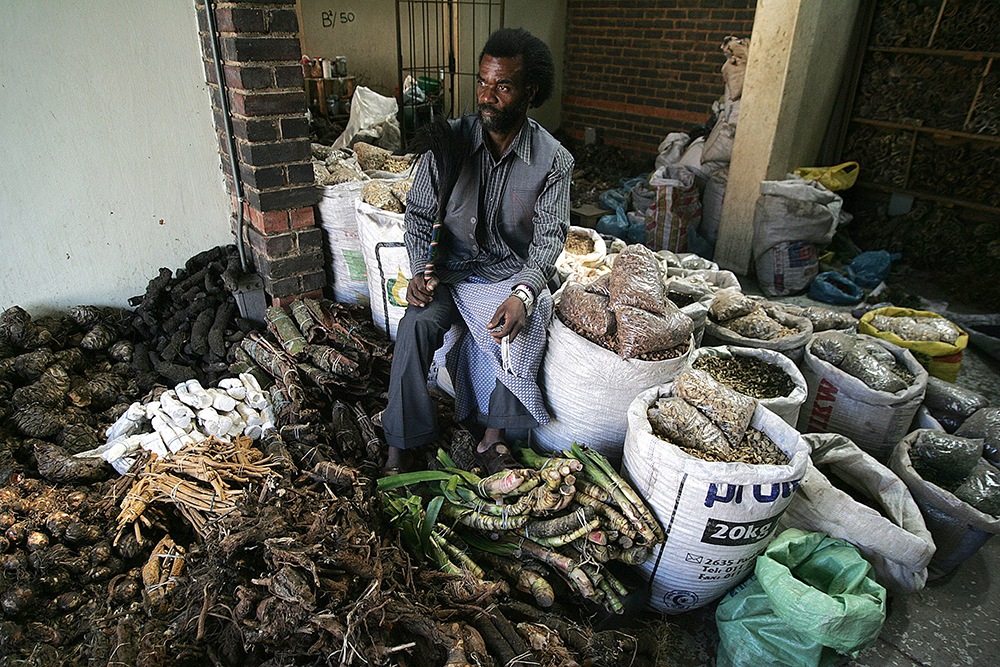
Samson “Ngonyama” Mvubo, who’s been practicing as a traditional healer since he was a 10-year-old, sits inside his shop on September 2, 2009 at the Faraday market in Johannesburg.This is where South Africans come to seek help for anything from high blood pressure to warding off bad dreams. PHOTO: PABALLO THEKISO/AFP)
In addition, a misconception abounds that traditional healers or ‘izangoma’ are evildoers possessed by foul spirits. Ironically, this is the main reason people end up sourcing their medicinal needs from black market suppliers, who among them are charlatans masquerading as traditional healers. Consuming their alleged ‘medicine’ is unsafe and poses death risks associated with ‘traditional medicine’. This gives rise to the need to regulate the traditional medicine system, to allow people to understand how it works and have the means in place to identify counterfeit medicines and practitioners.
From a policy perspective, there is an urgent need to craft and implement more robust regulatory processes for better governance of traditional medicine and also for the exposure of counterfeit traditional practitioners. This will serve to reduce the death rate affiliated with the use of traditional medicine and traditional healers (“the average number of deaths from traditional medicine poisoning decreased from an average of six per year (1981-1985) to one per year (1996-2000, for parts of North west Province, Northern Province and Mpumalanga”). A traditional healer who practices legitimately is bound to be known within a community, and as such, he or she is held accountable for diagnosing and treating patients, including being aware of any side-effects and complications caused by their prescribed medicines.
Traditional healing, practiced correctly, can serve as an effective healthcare system and remains affordable for those who cannot access modern healthcare. This creates an opportunity for all registered healthcare practitioners to be included in the formation of healthcare policies. Regulatory procedures and evidence-based criteria would determine who may register and who may not, and would control the health-related and societal risks that currently bedevil traditional medicine practice. In turn, this would assist with governance solutions to the problem of inequality and knowledge asymmetry in the traditional healthcare system.
When the world is facing life-threatening illnesses, tested traditional medicines should be considered as a viable alternative. There is a critical need for equal measures to be instituted to test and regulate all kinds of known medicines. Therefore, relevant governance institutes such as the Medical Research Council should make the case for better governance processes to ensure that local knowledge is harnessed and not ignored, and that charlatans (in all medicine) are crowded out. The current official healthcare system is overwhelmed and some of the resultant gap in equitable access to healthcare may be bridged through traditional medicine (rightfully practiced and regulated). Hence the need for a more inclusive policy process and a new debate.
Sixolile Ngqwala holds a Master of Commerce (MCom) in Economics from the University of Fort Hare, where he worked on the National Income Dynamics study (NIDS), based at the University of Cape Town, for Econometric research (econometric modelling, data coding, data mining, data analysis and interpretation). Sixolile has two BCom undergraduate degrees (in economics and in business financial management and industrial psychology). For his BCom Honours he majored in econometrics and economics. He has multidisciplinary skills, including an intersection of machine learning and data science (PYTHON and R-programming). Sixolile has background experience in natural resources, working with AngloGold Ashanti in the finance department. Later, he joined CNH-Industrial as a junior strategic developer and government relations. In 2019 he joined Good Governance Africa as a lead researcher, where he is responsible for quantitative and qualitative data management and statistical analysis on research projects relating to natural resources, land reform, and policy analysis, among others. At university he was involved in starting an academic society, New Economic Horizon, that fostered a working relationship between the Auditor-General’s office in the Eastern Cape and the University of Fort Hare’s accounting department.

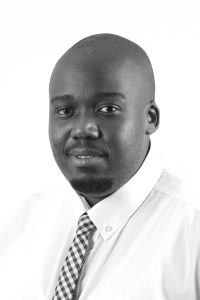
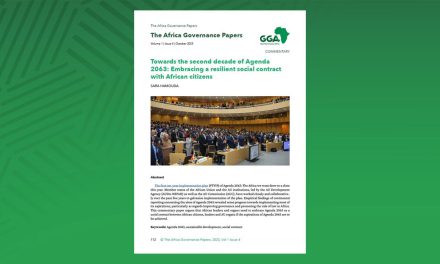
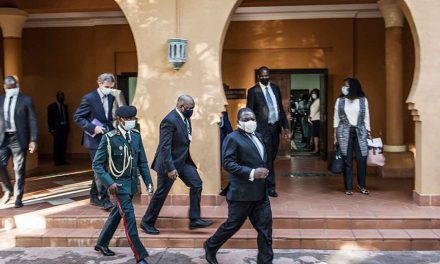
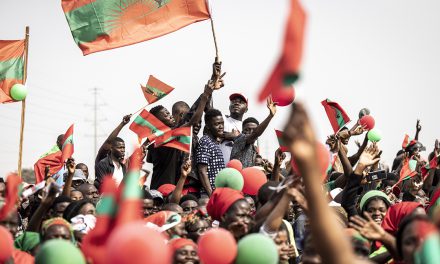
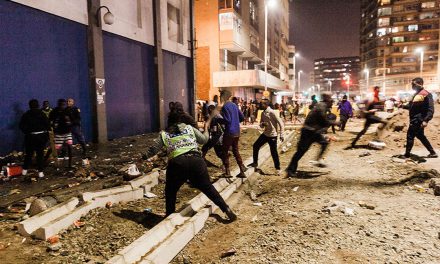


Wow, very impressed and informed, especially about the research on umhlonyane, le Gama in tswana, to be well explained and analysed correctly
Hi Kealeboga,
Many thanks for your response and your kind words. Kindly keep an eye on our page for more*
Interesting it’s high time we embrace the african medicines like our forefathers used. Life was simple and they did not depend on clinics and hospitals. They lived longer and even now with the Convid 19 many of the African people used Mohlonyane to help curing thr virus. Please share more about the African medicines. I thank you for this article it’s worth reading.
Hi Jim,
Many thanks for your response and your kind words. Kindly keep an eye on our page for more*